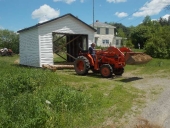




“Normality is a paved road: It’s comfortable to walk, but no flowers grow on it.” - Vincent van Gogh
 2
2




I want to be 15 again …so I can ruin my life differently.
 3
3








Jodie said, "The USDA loan specialist said the lot size limit was an acre, defined by the requirements of location of well to septic, etc.
Invasive plants are Earth's way of insisting we notice her medicines. Stephen Herrod Buhner
Everyone learns what works by learning what doesn't work. Stephen Herrod Buhner
 1
1




Steve Zoma wrote:I have got USDA Loans and Grants before, but they seem a lot different than what you are describing. That might just be because of where I live though...
The loans I got through the USDA I had to prove I could NOT obtain credit through any private organization first. The USDA is not a bank, nor do they want to be, they just want to ensure that farms keep producing food for a hungry nation, and important consideration since only 1 out of 200 Americans are farmers producing food. Even then, you can only do this (7) times in your lifetime. They will check your credit, but its the opposite; its to see if its too bad for private bank loans not for credit worthiness.
They can be for different things of course, from buying a new farm to expanding an existing one, but don't get too excited; if you have no credit, don't have a down payment, want a low interest loan, and want a farm... and this sounds too good to be true, it sort of is. There is such a demand for this type of loan that here in Maine anyway there is a 3 year waiting list, and no guarantee you will get the loan even then. But the problem is not with YOU waiting, but with finding a seller willing to wait three years. Best wishes in finding a seller willing to wait that long.
Even though I have got USDA loans, as a seller I would never sell anything to someone using one. The length of time it takes to go through, and the rules themselves are just too restrictive. In fact, when I sell land, I tell the realtors upfront that I will not accept any offers with USDA or FHA loans attached. Every possible inspection is carried out, then the seller is required to fix the problem, and not the buyer. This means with every inspection the selling price is reduced, or the seller has to have the fix done by certified contractors, not merely doing the work themselves to fix the problem. And guess what... every inspector has to justify their cost so they find something. So as you can imagine, every seller wants that! (insert sarcasm here).
No matter if it is a lawnmower or, 200 acres of land; I put a fair deal on anything I sell, and hope to find a buyer who appreciates that fairness right up front. With governmental loans, I get it, and know they have their place and have taken advantage of them a lot over the years, but when you take the Kings shilling, you do the King's bidding, and there is just too many rules to make selling something in that form of a loan. Selling has enough inherent stress, especially so with land withholdings, I want the easiest sell I can get and still have a fair deal for me and the buyer. USDA and FHA Loans just don't allow for that. I am not the only seller who feels this way; it is widely known to sellers, "Never accept a USDA or FHA loaned offer".
“Normality is a paved road: It’s comfortable to walk, but no flowers grow on it.” - Vincent van Gogh
 1
1




Anne Miller wrote:
I could be wrong though I feel this is because you are applying for a "USDA Direct home loan".
My suggestion would be to ask your local USDA representative if that is the case.
It could be that if you find a property that is larger than 1 acre that you might qualify for one of their other type of loans.
“Normality is a paved road: It’s comfortable to walk, but no flowers grow on it.” - Vincent van Gogh




You can follow my latest adventures at
https://www.unclemud.com
https://www.youtube.com/unclemud
https://permies.com/u/164246/Chris-McClellan
Buy my stuff at https://unclemud.com/store/








Budding permie fanatic.

|
It is difficult to free fools from the chains they revere - Voltaire. tiny ad:
Learn Permaculture through a little hard work
https://wheaton-labs.com/bootcamp
|






